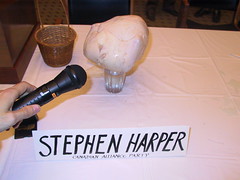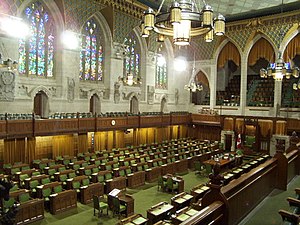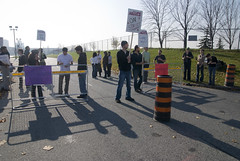That’s part of the reason we have a Parliament, and why it is so un-Canadian for Canada’s top politician to scamper away from the debates.
Today, Canadian Prime Minister Stephen Harper gave what has been billed as an “economic update,” talking about Canada’s economy in general, and taxes and infrastructure more specifically.
It isn’t all that uncommon for a Canadian prime minister to prov
 Image by Grant Neufeld via Flickr
Image by Grant Neufeld via Flickr
And that’s where the real power in our democratically elected leaders stems – in the House of Commons. Although to many outside the debate – and even some within it – it all appears to be a lot of political babbling, name calling, and other non-productive forms of communications.
The House of Commons provide a forum where the issues can be openly discussed and debated. It is through this discussion process, that our laws, rules, regulations and other policies which make us all the more Canadian are improved before becoming official.
 Image via Wikipedia
Image via Wikipedia
However, the children currently occupying the House of Commons – including all opposition leaders and our very own Prime Minister – have lost that notion, and instead focus on name calling and political back-stabbing.
That’s why although most economic report cards are issued by the Prime Minister or the Finance Minister in the House of Commons, today’s announcement was made on the other side of the country near St. John’s Newfoundland and Labrador. That’s as far from the opposition parties – and the debates – as possible.
Our fearless leader, Prime Minister Stephen Harper, ran away l
 Image by bgilliard via Flickr
Image by bgilliard via Flickr
Though the opposition parties also have a stake in some of the blame as well. It is because of their childish antics, threats to dissolve the house and call an election, and poor choice of strategies overall which have led our Prime Minister out of the house, to make important announcements about the country.
The real victims in all of this are not the politicians but the very citizens of Canada. Without these debates, public policies in the country will be passed when they should have been reviewed and revised. This means the rules and regulations which govern much of what we do could be flawed, or worse – fail to accomplish the very essence of what they were intended to do in the first place.
Although most Canadians don’t want another election so soon after the last one, maybe it is time to get rid of the children playing in the House of Commons, and replace them with adults who understand the whole reason they are there.
![Reblog this post [with Zemanta]](http://img.zemanta.com/reblog_b.png?x-id=142df709-f45e-4443-8a81-3797f3f8803d)

![Reblog this post [with Zemanta]](http://img.zemanta.com/reblog_b.png?x-id=36547e05-f6f7-4675-a370-605a99c4831b)



![Reblog this post [with Zemanta]](http://img.zemanta.com/reblog_b.png?x-id=5f28b0e2-89e7-464e-8652-6b869533f2a1)



![Reblog this post [with Zemanta]](http://img.zemanta.com/reblog_b.png?x-id=a3ceb73b-3702-4fb3-b5c9-cf995573bf2f)



![Reblog this post [with Zemanta]](http://img.zemanta.com/reblog_b.png?x-id=f2c87407-ab3b-4a04-90c8-e9a0d250eed5)

![Reblog this post [with Zemanta]](http://img.zemanta.com/reblog_b.png?x-id=5cd4f1a8-6548-4005-9801-dbce35e45d87)

![Reblog this post [with Zemanta]](http://img.zemanta.com/reblog_b.png?x-id=b61334f3-4d65-462c-b82f-d27c225140c8)
![Reblog this post [with Zemanta]](http://img.zemanta.com/reblog_e.png?x-id=36bc1117-9869-4a89-9db4-a4ef25b925ee)







